Two left and six returned, after visiting 102 countries on five continents, with an irrepressible desire to tell that the most beautiful thing they found was the people, and to tell the world that no matter how impossible a dream may seem, it is not only possible but must comply.
the of Herman and Candelaria Zapp It was a long-standing dream that had been postponed for years, until it became “crazy”, because it is one thing for a couple of teenagers to go backpacking to travel for a while, and another for a married couple in their 30s. years old, with steady jobs and a newly built home, just pack up and go.
LOOK: 3 unknowns surrounding the famous escape from Alcatraz 60 years later
“I have known Cande since she was 8 years old and when she turned 14 we became boyfriends, and we always imagined ourselves traveling. We proposed that two years after we were married we would leave, but you know what life is like! The excuses, the fears… everything was postponing sleep,” Herman told BBC Mundo.
After six years of marriage, what was on the horizon were children but, although they wanted them, the prospect set off alarms: “If we have them we will never be able to travel because with children you cannot,” they thought.
So they did “the best thing we could have done: put a date on the trip. January 25, 2000“.
Initially it was a trip to the other side of the world, which for the southern Argentines meant reaching the boreal Alaska.
Although nothing was exactly planned, they calculated that it would take 6 months during which, using various means of transportation, they would travel America from end to end.
“Very very crazy”
“Talking about going to fulfill your dream in 2000 was not the same as in 2020; dreams were something to dream about. There were no social networks showing you other travelers or communicating with people from other countries, so people felt that what we were planning was very, very crazy.
There came a time – Herman says – when they stopped telling the family the details because, on top of the fact that they were going to embark on this adventure without any experience or enough money, they made an apparently ridiculous decision.
That decision has name, surname and even passport: Macondo Cambalache, a mix of magical realism with tango.
It’s an unexpected traveling companion who joined them three months before they left: a 1928 Graham-Paige Detroit-made classic car that Herman fell in love with.
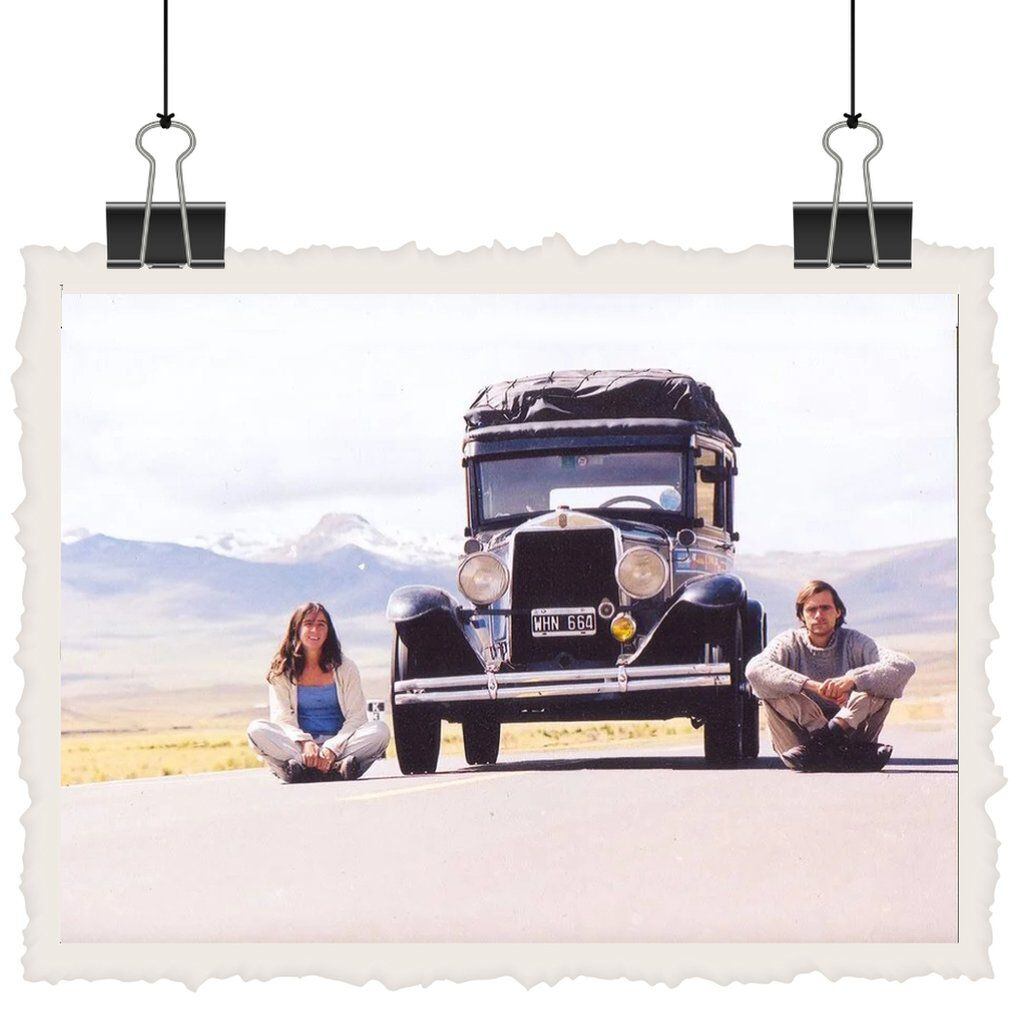
He brought it home in a tow truck, since it wouldn’t even start, and announced to Candelaria: “Change of plans: we’re going by car.”
Though it didn’t seem to promise much more than trouble, he scoured 362,000 kilometers at his leisurely pace, “drawing smiles from those who saw him pass by”.
“tragic moment”
His style of traveling was always that known as “There we go seeing”, which most of the time gave excellent results.
But when they ran out of money for the first time “it was a tragic moment … desperate”Herman remembered.
“We were in Ecuador, where the economic situation was very bad. They had gone from the sucre to the dollar. A good salary was a maximum of US$60, so we would never be able to save to continue traveling.”
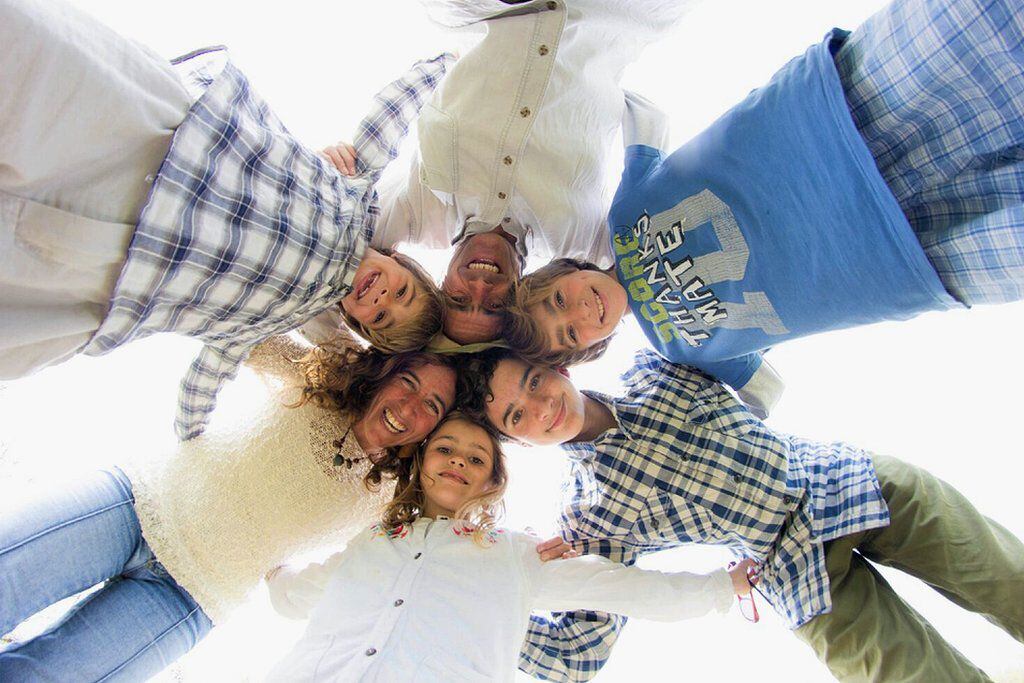
Candelaria began to paint – “some very nice pictures of birds … she really has a wonderful gift” – and Herman framed and sold them.
“We did very well in Ecuador, which gave us strength.
“After Colombia, a man who had a printing press asked us the typical question of how do they finance themselves? We told him that with the paintings, but that we needed something smaller.
“He took some photos of our trip and brought us 500 postcards and some notebooks whose covers were the photos.
“The idea was for people to write their dreams on them, but they told us they wanted to read about ours, so we started writing them.”
They soon published the first of several books that would help them finance their journey over the years.
But they were also learning that there was another source of enormous wealth: the good will of the people.
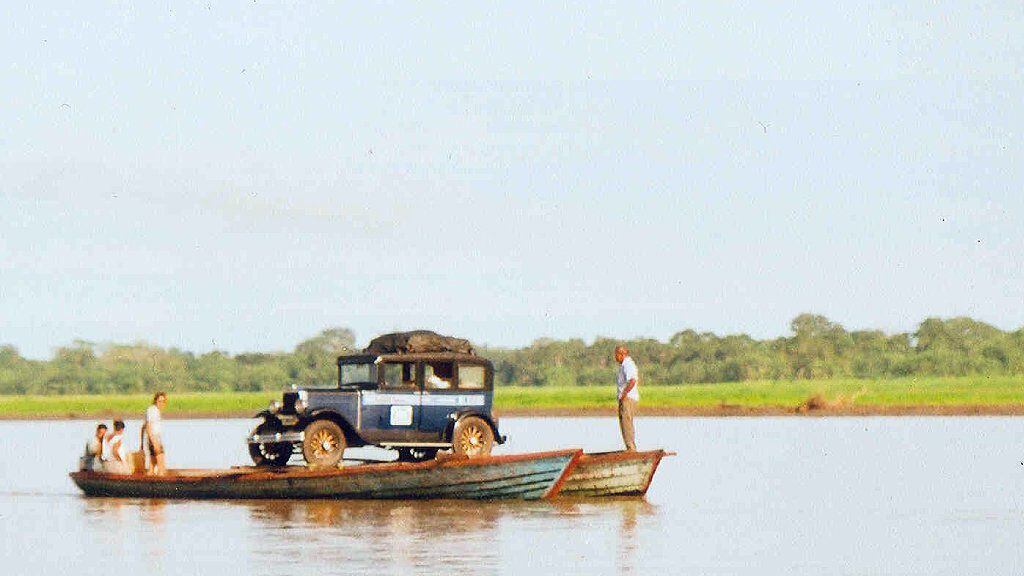
When they needed maritime transport to take Macondo Cambalache from Colombia to Panama, “we went to Barranquilla and spoke with the manager, and he replied: ‘We are going to make that return’ -as they say there-.
“He got us not one but three shipping companies that wanted to take him for free. I picked one and the owner of another that I didn’t pick told me, ‘At least let me pay for your plane ride.'”
“At first it was somewhat difficult, but after a short time we realized that it was the best thing about traveling is what you do without money“.
the first baby
After nearly two years of travel, they felt that “something was really missing.”
“In addition, Candelaria’s sister had not been able to have children and was undergoing all possible treatments, so we thought that if we had the same problem, it was better to start before the years passed.
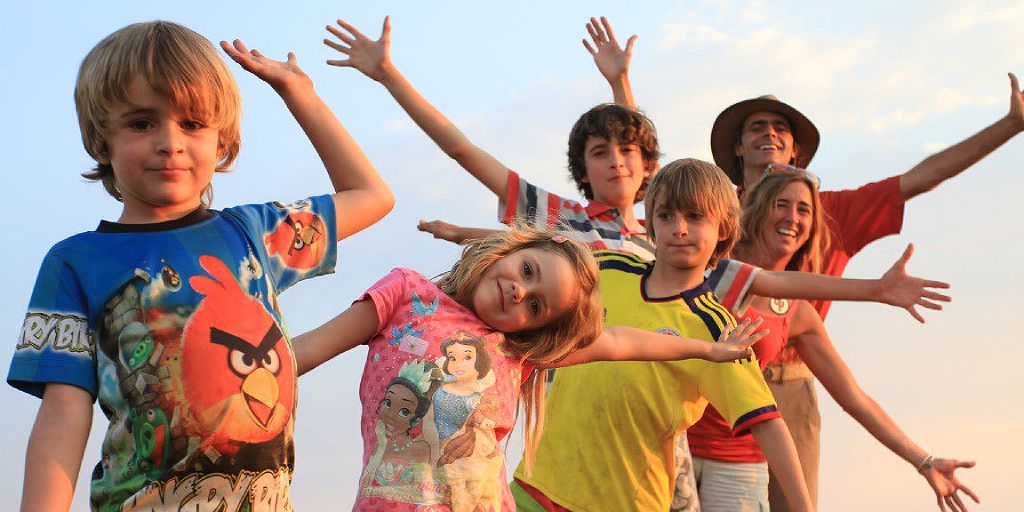
“And, well, that famous September 11 (2001) we hugged each other a little bit tighter.”
In Belize they confirmed that Candelaria was pregnant and they panicked.
“yes panic, because one thing is to have the idea of being a father and another thing is to know that you are going to be. We didn’t have much chance to make money, or save…we weren’t that smart.”
To handle the situation, they put dates.
“15 days in Belize, two months in Mexico, three in the US, two in Canada and so we arrived just for the baby to be born in Alaska.”
But an Amish Mennonite community invited them to spend two weeks with them – “and I say, ‘Candi, when will we have the opportunity to be with Mennonites‘”-, and when they were in Cancún, they were invited to Cuba -“and I told her: ‘Candi, when are we going to have the opportunity to be in Cuba for 15 days’-“…
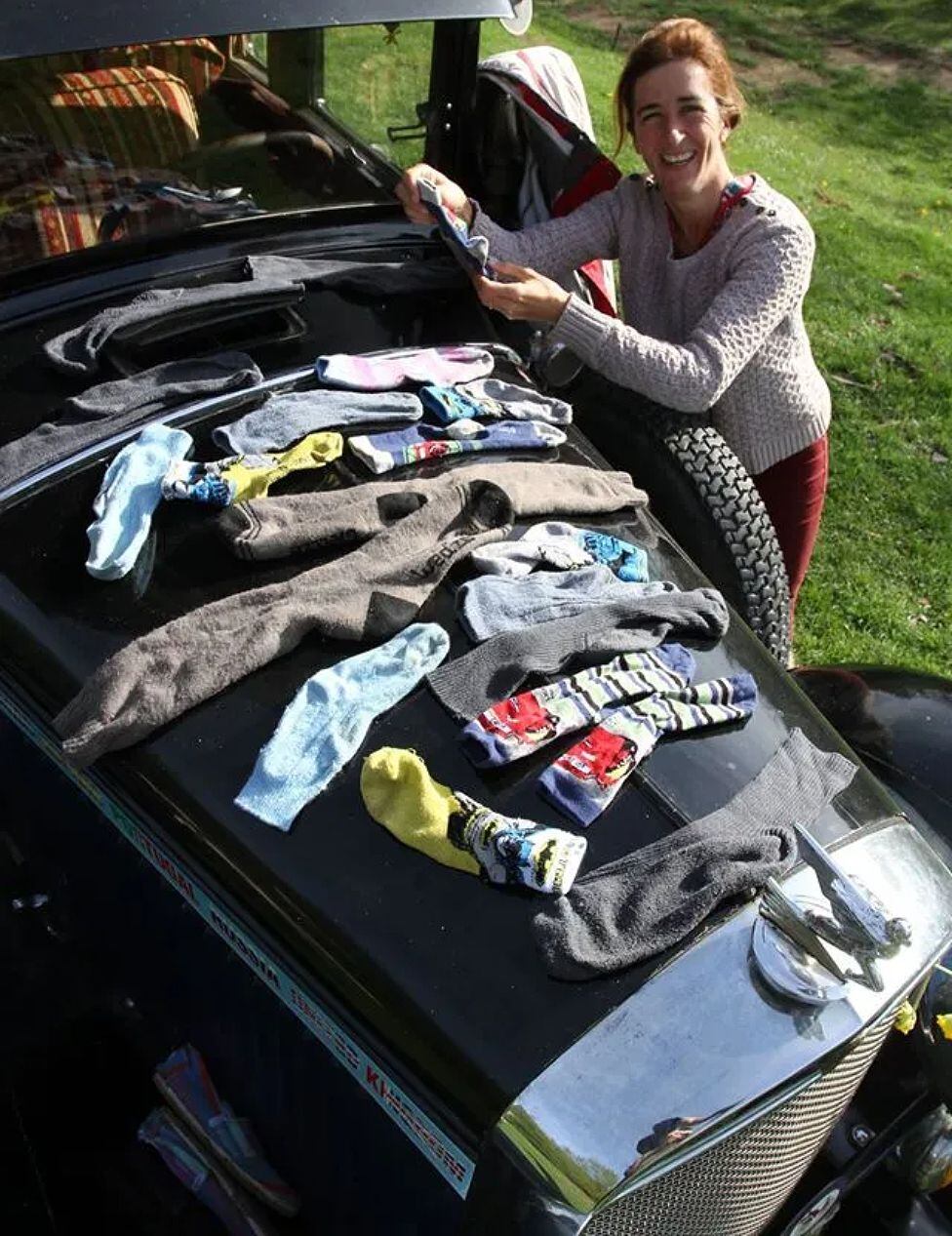
In the end, Pampa was born in 2002 in Greensboro, North Carolina, where they had been invited to a Graham-Paige vintage car meetup.
“It was magical.”
“We asked the government for help, because I was born in the US, but they denied me because I wasn’t a resident; we went to the hospital, and they told us that it was a private company so they charged (more than US$12,000), so they We went to the newspaper to ask people for help,” Herman recalled.
“They made a very nice note about our trip, our dream, our destination, but also our situation, and it said that if they wanted to help us, they could call the phone number of the family that had welcomed us.
“The phone did not stop ringing for 4 days.”
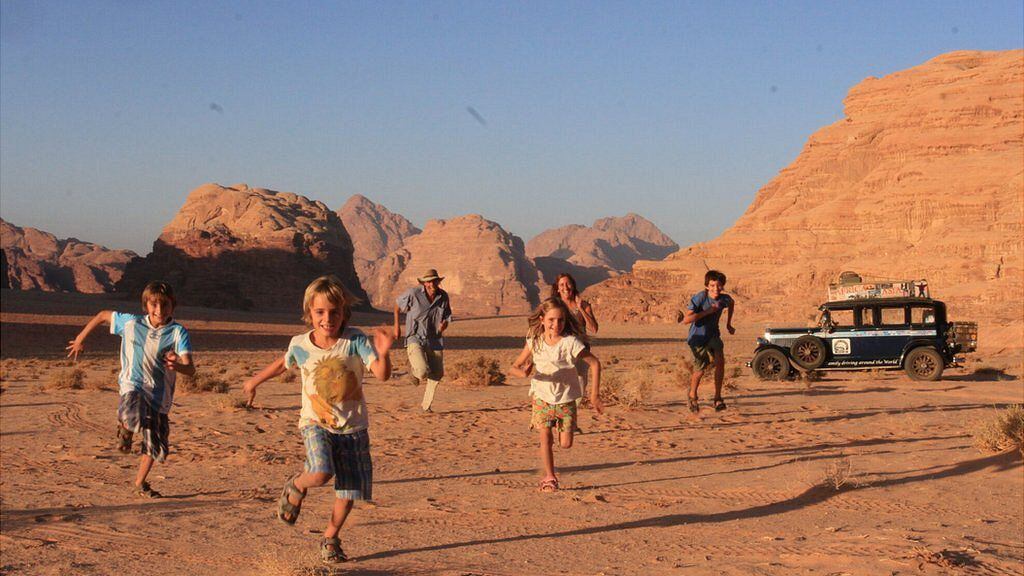
From a grandmother who wanted to send a sweater that she was knitting to her grandson, to doctors and nurses who offered not to charge if they were on duty at the time of delivery.
Different churches organized fundraising events, while vegetables and fruits were brought to them and books and paintings were bought from them.
“In the end we just paid for the hospital hotel. It was really nice that we didn’t have any money because now we have a family in North Carolina.”
And Alaska?
“We did not arrive in six months Alaska… we arrived in three years and 9 months. There was a small miscalculation.”
But before reaching his dream, something peculiar happened.
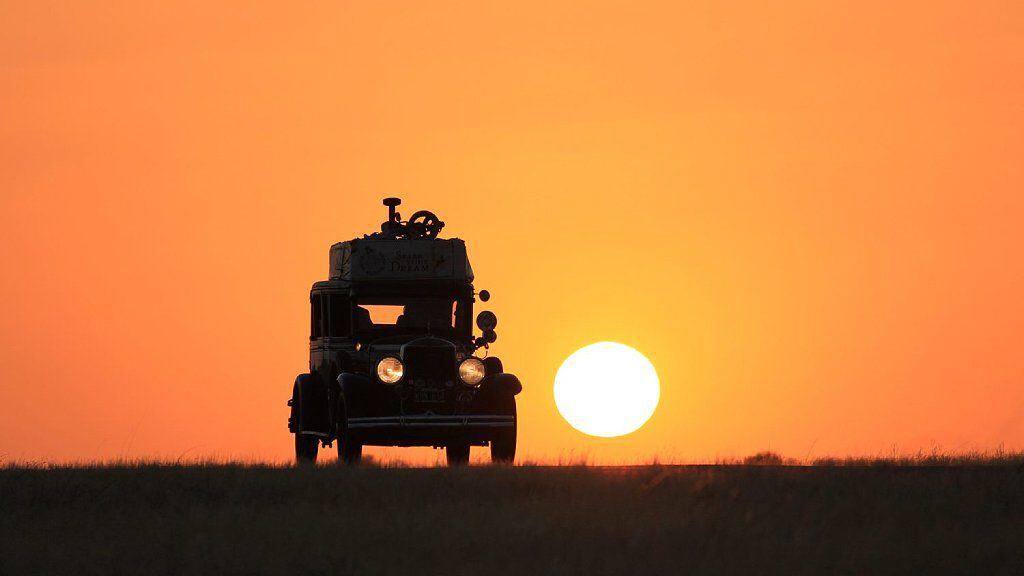
“When there were 30 km left to get to Alaska (and a sign said so), and Cande tells me:
–‘I don’t want to arrive’
-‘How come you don’t want to get to Alaska?’
-‘It is that if we arrive, the dream ends, and the beauty of a dream is not to fulfill it, is living it, being in it‘.
“Then we had to stop to see what we could find to arrive happy.
“And we found that Alaska was the end of one dream but also the beginning of another.
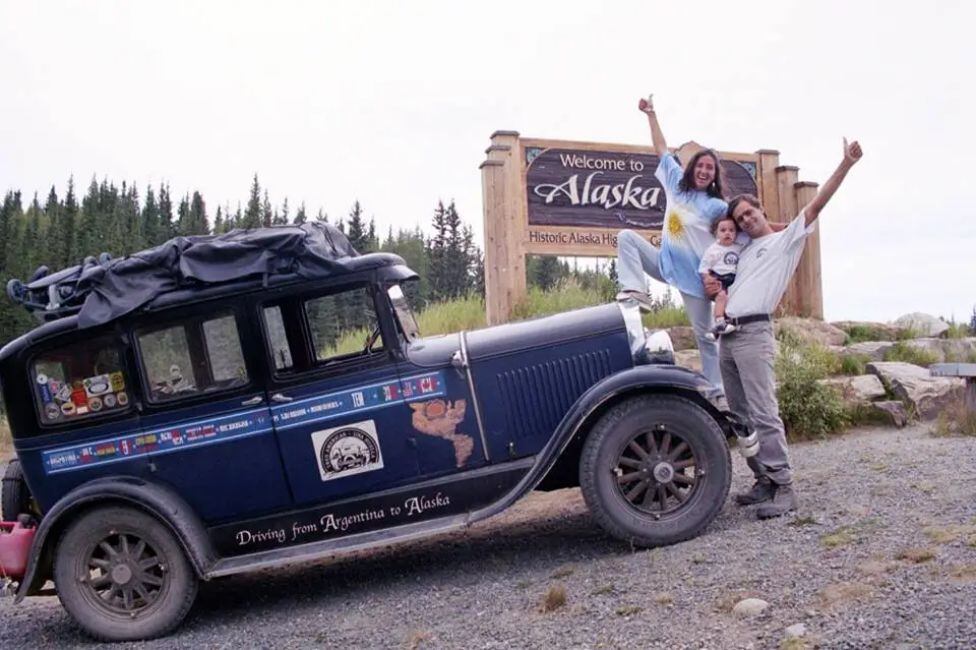
“We set ourselves the goal of continuing to travel.”
But they had to return to Argentina.
a giant garden
Candelaria’s mother was sick.
5 days after returning, her second son, Tahue, was born in Capilla del Señor, in 2005. At 13 days old, they set out again.
With the arrival of Tahue, and the desire to have more children, they realized that Macondo Cambalache was going to stay small.
As “one does not have to adapt to things, but things have to adapt to one”, they cut it in half to put one more row of seats.
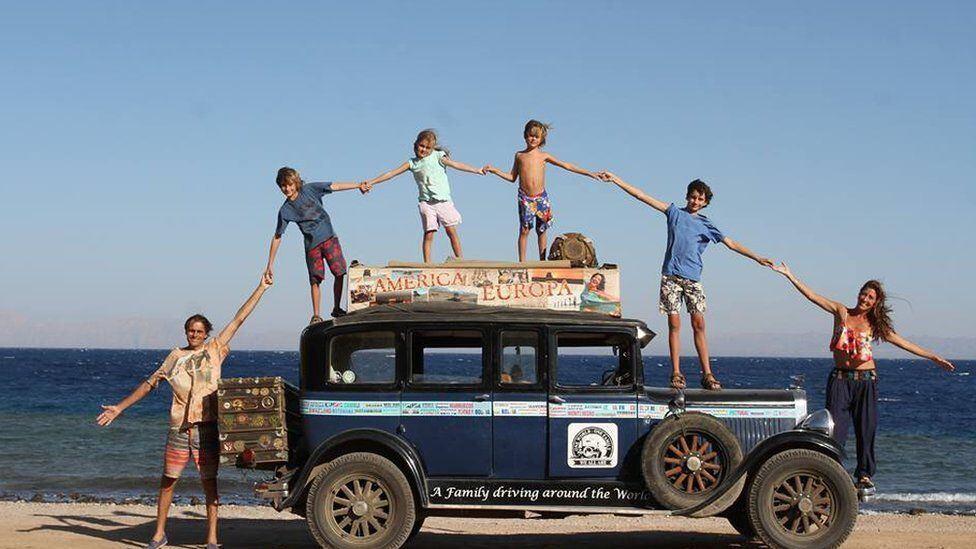
Thus, the children could sleep in a tent that was on the roof, and the parents, below, in the chairs that became beds.
In the “room” above, they were joined by Paloma, who was born in 2007 in Vancouver, Canada, and Wallaby, born in Australia in 2009, as well as Timon the dog and Hakuna, the cat.
“The amount of things you have to take out to make room for them! They need car seats, cribs, diapers… When they were born we were all left with nothing, but How good to change things for children!“.
The kitchen was in the original wooden trunk.
“A small house with a giant garden, which they have not yet finished knowing”, in which they spent countless nights facing the sea, lakes, rivers, islands, mountains and deserts.
The starting point
The Zapp family definitely returned to Argentina (for now) in February 2022.
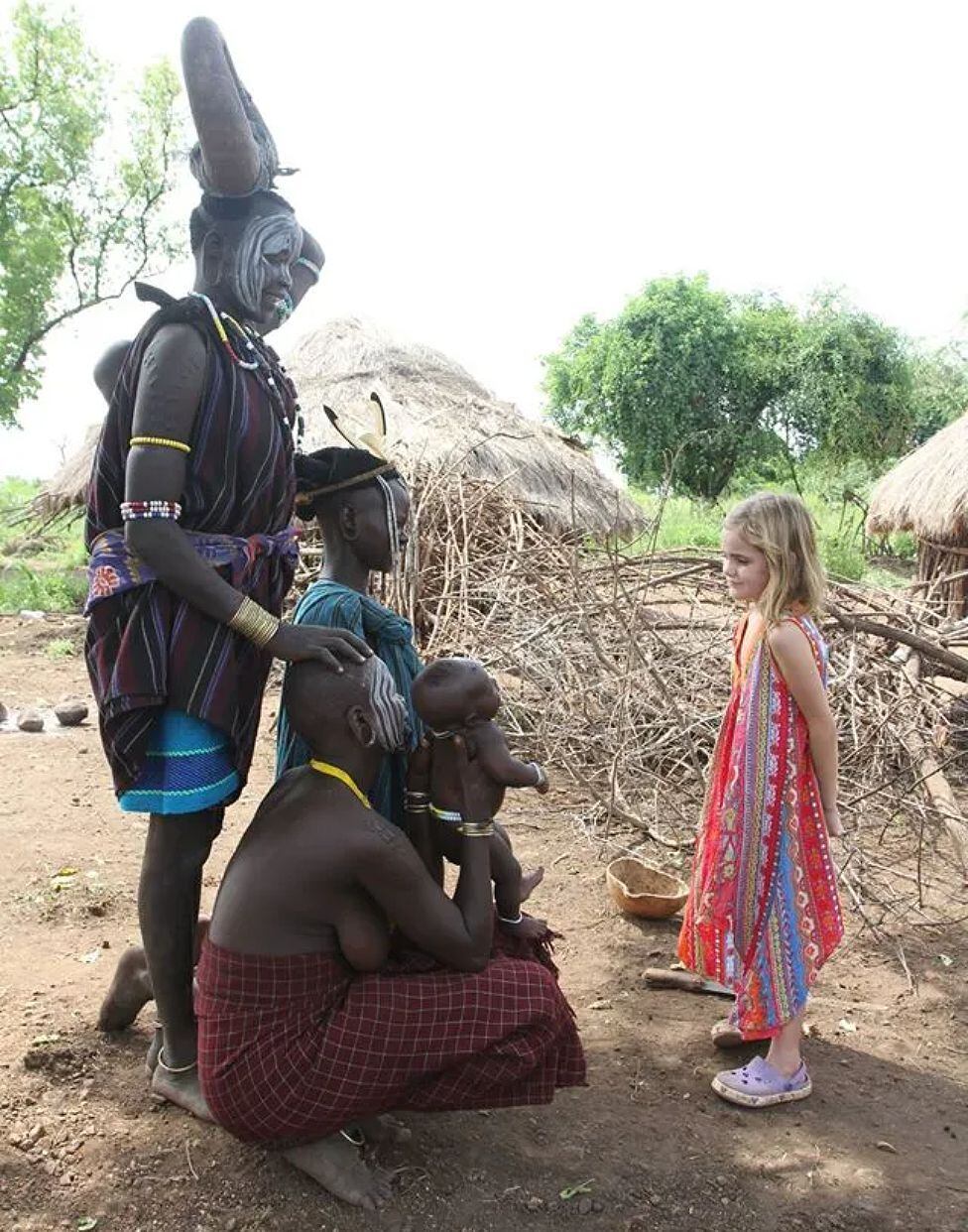
The children are not so young anymore: Pampa is 20 years old, Tehue, 17, Paloma, almost 15, and Wallaby, 13.
They came back with an enviable education.
“They learned geography by going through it; languages, playing with other children; social sciences, sharing with people from all social strata and cultures, and they saw that there were thousands of ways to pray, to live, to eat.
“They saw the food chain in action in Africa, when a cheetah ate a deer that was eating grass and a leopard stole the cheetah’s prey, and they learned biology by diving in the sea…
“They had the best classroom and the most beautiful“.
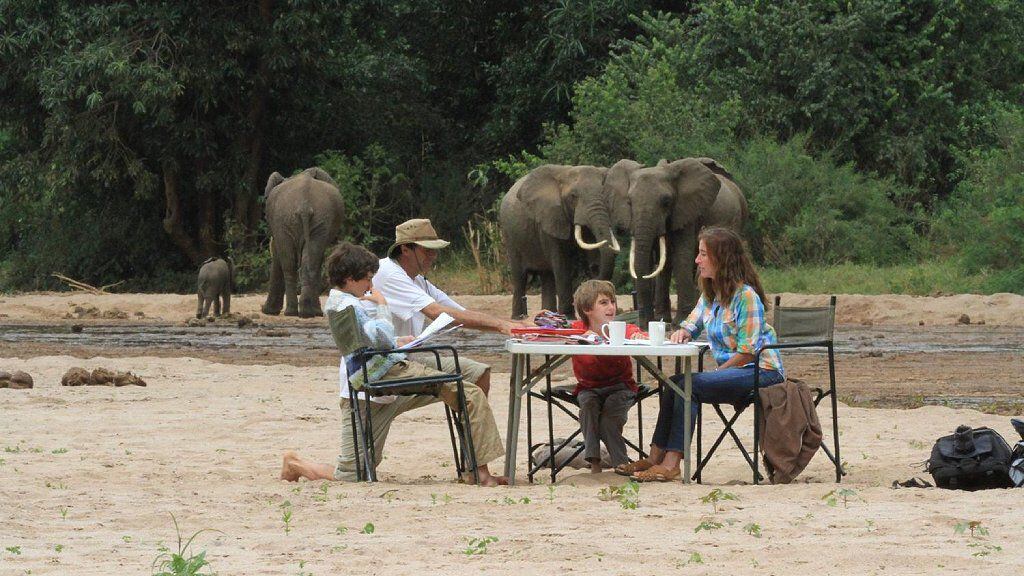
Now they have to get used to the ordinary so that they can choose what kind of life they want to have.
Herman and Candelaria are aware that, although “we were able to give them the world,” the trip deprived the children of sharing day-to-day life with grandparents, uncles and cousins, or ever-present friends.
“Now they are experiencing being in a single house, with a schedule, waiting for the holidays… so later they can decide what they prefer, because if you never taste chocolate, you don’t know if it’s tasty.”
His parents, meanwhile, they keep walking the roadsalthough to closer places.
“What we most want to do now is help fulfill dreams and we are going from town to town carrying the news that, despite politics, the economy, the world situation, the war, the virus, one can create their own reality. .
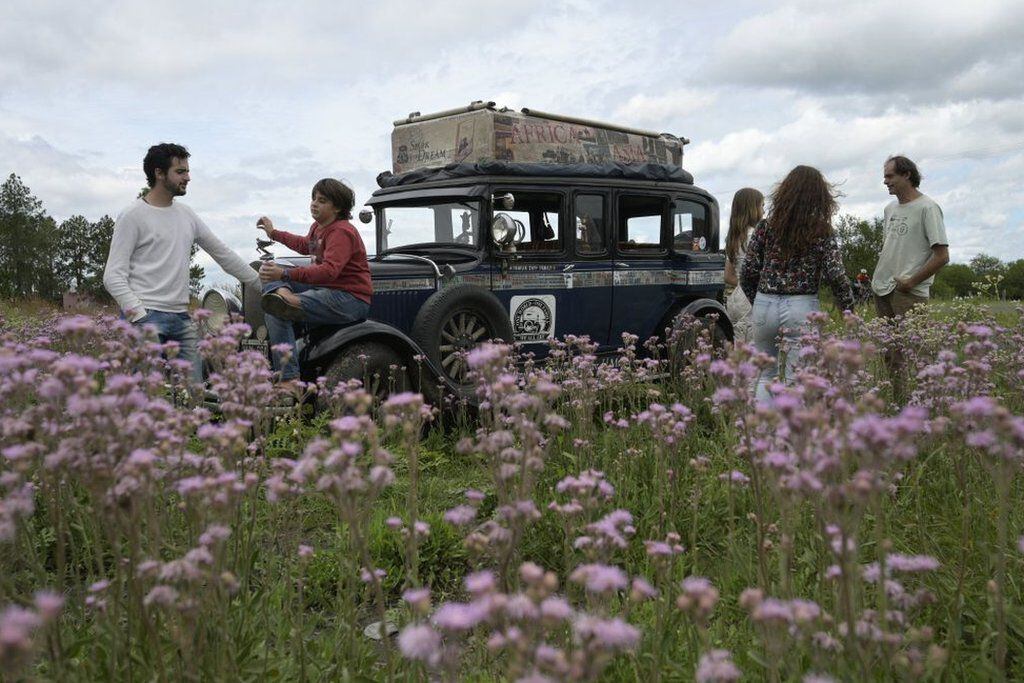
“Besides, one is not alone.We are among 7,000 million friends!
“I needed many boats and the man or the company that offered himself always appeared, and not in exchange for publicity, but in exchange for being part of it. And there were more than 2,000 homes that opened their doors to receive a family they did not know.
“And so a thousand things that show that it is a wonderful world that loves being part of the dream and that all one has to do is share. We did not come to be alone. Things are richer and tastier when we share them, right?
But that does not mean that they are going to stay still: next year they plan to go around the world in a sailboat like the one they crossed the Atlantic.
“It was older than Macondo Cambalache, from 1908… beautiful!”
And, with all your experience, what is essential to bring?
“Only two things: wet wipes and you win, because if you feel like it, who can stop you?”
Source: Elcomercio
I, Ronald Payne, am a journalist and author who dedicated his life to telling the stories that need to be said. I have over 7 years of experience as a reporter and editor, covering everything from politics to business to crime.

:quality(75)/cloudfront-us-east-1.images.arcpublishing.com/elcomercio/2SEJWD25HVAKDJKW7PNFF5B7AQ.webp)

:quality(75)/cloudfront-us-east-1.images.arcpublishing.com/elcomercio/OGCTMCKQJBAOLI4HRVYVJFEEI4.jpg)

:quality(75)/cloudfront-us-east-1.images.arcpublishing.com/elcomercio/BJBQ4P3D4BG6VD5ZCD7JLLJP7I.jpg)
:quality(75)/cloudfront-us-east-1.images.arcpublishing.com/elcomercio/2UWLFA2YVRFM5DKNK7VAEXCHWI.jpg)
